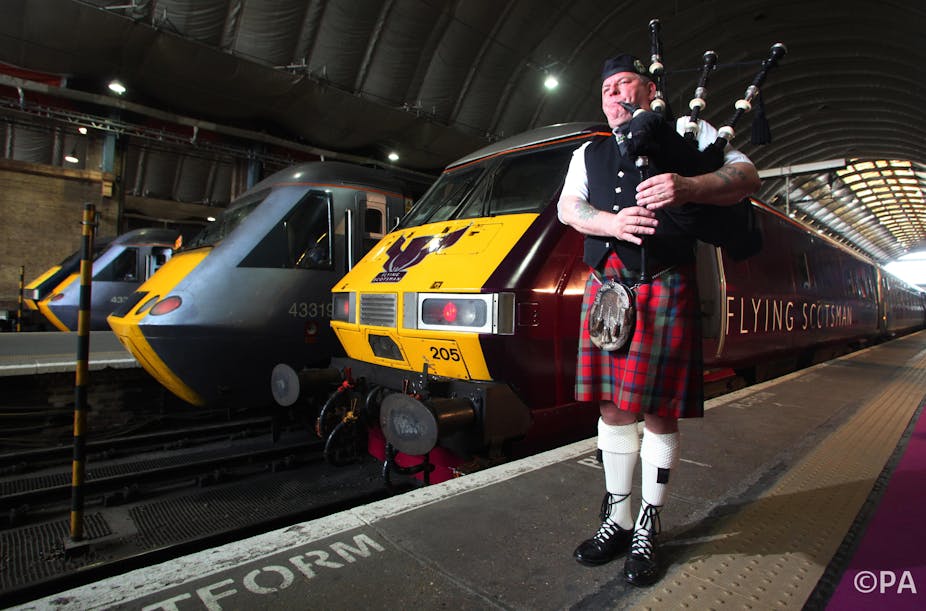Several train operators are bidding for a contract to run the main train line between London and Edinburgh, but the only company that has made a success of the line will be excluded. Why?
For the past five years, the line has been operated by East Coast railways which has delivered consistent profits and the country’s most satisfied long-distance passengers.
But East Coast is a nationalised company, owned by Directly Operated Railways, a government holding company set up specifically to take over failed rail franchises. And state-owned companies are barred from even tendering for this flagship route.
Whichever way you look at it the decision to reprivatise is perverse. The finances don’t add up, the economic benefits will be non-existent and transport won’t be improved.
This is without mentioning that the profits being generated on this route are currently being ploughed back into the industry rather than being distributed as dividends to private sector shareholders.
History lessons
The railway industry has still not forgotten how the West Coast franchise bidding process spectacularly descended into farce amid accusations of financial modelling mistakes and political incompetence. But the East Coast franchise is also no stranger to controversy.
The mainline has had two other operators since it was privatised in 1995: Great North Eastern Railway (GNER), and National Express East Coast (NXEC). Both ran into financial difficulties and were forced to quit.
The principles underlying the awarding of franchises are straightforward in theory. Bidders must first prove they can meet minimum levels of service provision and demonstrate they have secured funding. Beyond that, franchises are largely awarded to the operator who will pay the government the highest premium. This premium is dependent on future profit levels, which leads to bidders making some optimistic predictions about future passenger revenues in order to secure the contract in a blind auction. This bidding structure sets private operators up to fail, by the standards of their own optimistic predictions.
The east coast line’s first franchisee was the Great North Eastern Railway; a subsidiary of a Bermuda-based transport conglomerate. At first, GNER was profitable largely because at the time the industry was heavily subsidised. But by the time the contract to run the line came up for renewal in 2005, franchisees were generally required to pay premiums payments to secure the right to operate the line. As a result, GNER bid an astronomical £1.3 billion for a ten year franchise.
The operator soon realised it had grossly overbid. In the first year passenger revenues rose by just 3.3% compared to a projected 9.9%; costs rose too, faster than predicted. Within two years the government asked GNER to surrender the franchise.
GNER clearly knew the risks. Its failure was hardly surprising given Christopher Garnett, its then CEO, claimed it was better “to overbid and win than underbid and lose”.
But the CEO’s unspoken words were just as important. The punishment for overbidding was so low as franchises were operated by specially created ring-fenced companies, which could then be collapsed with minimal legal and financial penalties if the payments became too onerous.
Indeed, this is exactly what happened with GNER’s replacement franchisee. National Express East Coast won the franchise with yet more utterly unrealistic projections of future passenger revenue. Just like its predecessor, NXEC simply walked away from its contract within two years of operating the service.
Both operators made bids based on the most optimistic assumptions about passenger revenue within the context of a franchising model that encouraged aggressive and unrealistic bidding behaviour. Essentially, the punishment for overbidding, and failing to deliver on franchise commitments, was simply too low.
Success story
It is no surprise that the one operator which didn’t take over through competitive bidding is the sole success story. Since East Coast took over in 2009 passengers have been happy, and profits have been returned to the taxpayer. Its current management must find it galling that the government insists they are unsuitable to apply for the franchise again.
But ideology dominates evidence. On the basis that the private sector is inherently “good” and the public sector is “bad”, East Coast trains must terminate its operations in 2015.
Allowing East Coast to tender would at least provide a “benchmark” to assess costs and expected earnings. But the only operator with a proven track record of success on the line is banned from applying.
Rail unions are unanimous in condemning the sell-off; one union leader denounced it as “economic vandalism”. The unions are right: privatising the east coast main line will do little for the quality of train services, for passenger fare levels, or for the taxpayer.

